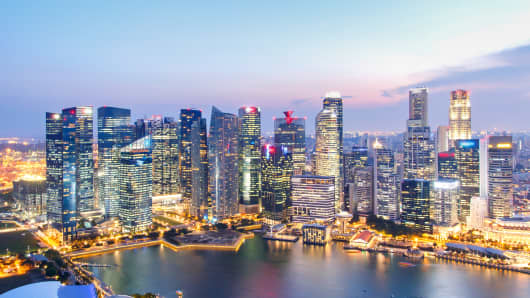
Pakin Songmor | Moment | Getty Images
Singapore's financial district.
With an election looming, the Singaporean government is expected to announce on Monday a "generous" budget that subsidizes health care and other costs of living for a substantial portion of the population.
"Budget 2019 will likely be generous and expansionary, setting the stage for a possible early general election," analysts from Malaysian financial services firm Maybank Kim Eng wrote in a recent report.
Singaporean Prime Minister Lee Hsien Loong has suggested that the election, which must be held by April 2021, could take place as early as this year. Lee's People's Action Party has been in power on the island since 1959 — even before the city-state became independent.
The impending election and the need to spur economic growth amid a challenging global environment mean the government will likely — for the first time in four years — spend more than it is projected to earn.
Singapore's budget deficit for the year starting April 2019 is estimated to be between 1.2 billion and 6.9 billion Singapore dollars (approximately $883.3 million to $5.08 billion), according to five analyst forecasts compiled by CNBC. That's around 0.3 percent to 1.5 percent of the country's gross domestic product.
Singapore's financial ammunition
The tiny but wealthy Southeast Asian city-state can, in theory, fund a much bigger deficit than what's expected because it has accumulated large surpluses from past years' budgets. Under Singapore's constitution, the government's revenue and expenditure must be balanced over a typical five-year term. Budget 2019 is the fourth — and possibly last — before a new electoral cycle.
From 2016 through the current financial year, the country is estimated to accumulate surpluses totaling 20 billion Singapore dollars, according to analysts from Citi. That would give Finance Minister Heng Swee Keat — who's tipped to take over as prime minister from Lee — financial ammunition to fund higher spending in the next year or two.
But Heng is not likely to spend all of that money, Citi added. Singapore is typically conservative in managing its finances, so Citi analysts projected that more than half of the surpluses will eventually head to the country's reserves.
A big ticket item
An expected big ticket item in the coming financial year's budget is a raft of health care subsidies for roughly 500,000 Singaporeans born in the 1950s — a national program called the "Merdeka Generation Package." Merdeka is the Malay word for independence.
The initiative was announced last year by Lee, who said more details will be revealed during the budget speech on Monday.
"It's about growing the pie. Growth means a steady rise in revenues from which to fund expenditure."
-Irvin Seah, senior economist at DBS
Economists from Singaporean bank OCBC said the package could cost 4 billion to 7 billion Singapore dollars, but analysts from Citi and Maybank Kim Eng estimated the price tag to be as high as 8 billion Singapore dollars.
If the 2019 budget does turn out to be a pre-election spending spree, OCBC analysts said — based on the bank's analysis of past government expenditure — there could be personal tax income rebates and cash bonuses for Singaporeans.
Powering the economy
Singapore's economy is highly dependent on global commerce and is therefore vulnerable amid the ongoing trade war between the U.S. and China. Gross domestic product in the Southeast Asian country grew 3.2 percent in 2018, slowing from 3.9 percent the previous year. Growth is expected to moderate further in 2019 amid a challenging external environment.
Against that backdrop, the country's finance minister said Thursday that the upcoming budget will help companies improve productivity and stay competitive. That's a continuation of past years' effort to incentivize firms to use technology and innovation to expand their businesses.
The Singaporean workforce is also a focus, the minister said. That could mean incentives for workers to learn new skills, analysts said.
Ultimately, growing the economy should be a priority because it's "the best way" to fund the increase in social spending that comes with an aging population, noted Irvin Seah, senior economist at Singaporean bank DBS.
"It's about growing the pie. Growth means a steady rise in revenues from which to fund expenditure. But with the population aging and productivity growth moderating, it is hoped that the next stage of growth will be driven by local companies venturing overseas," Seah wrote in a note.
New taxes may be coming
Given the greater spending needs ahead, Singapore's government could outline additional ways to grow revenue in the coming budget speech, economists said.
The government has floated the idea of a "sugar tax" on manufacturers and importers of packaged sweet drinks. Such a tax could make its appearance in Monday's budget speech, potentially adding 140 million to 500 million Singapore dollars to the country's annual revenue, Citi analysts estimated.
Another source of new revenue could be the taxation of digital services, also known as the "Netflix tax." Finance Minister Heng said in last year's budget speech that such a tax would come into effect from 2020, so analysts are expecting more details to come this year.
"Importantly, the inclusion of more e-commerce transactions would allow the government to capture significant tax revenue opportunities (or close the loop on tax leakages) from this fast-growing segment," Citi analysts said.
They added that taxing goods and services in the e-commerce industry could result in additional revenue of 500 million to 570 million for Singapore in financial year 2020.





